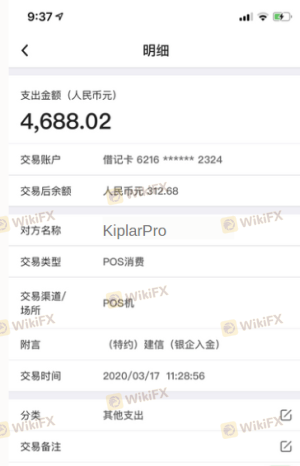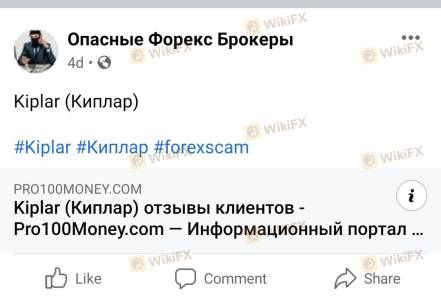Is Kiplar safe?

Pros
Cons
Is Kiplar A Scam?
Introduction
Kiplar is an online forex and CFD broker that claims to provide traders with a wide range of financial instruments, including currency pairs, commodities, and indices. Established in 2020 and based in Saint Vincent and the Grenadines, Kiplar positions itself as a platform for traders looking to capitalize on global market opportunities. However, in an industry rife with scams and unregulated brokers, it is crucial for traders to carefully evaluate the legitimacy and safety of any brokerage before committing their funds. This article aims to provide a comprehensive analysis of Kiplar, investigating its regulatory status, company background, trading conditions, and customer experiences to determine whether Kiplar is a safe trading option or a potential scam.
To conduct this investigation, we have utilized various sources, including regulatory databases, user reviews, and expert analyses, to evaluate Kiplar's credibility. The assessment framework includes examining the broker's regulatory status, company history, trading conditions, and customer feedback.
Regulation and Legitimacy
The regulatory environment is a fundamental aspect that can significantly impact a broker's legitimacy. A well-regulated broker is typically subject to strict oversight, ensuring that they adhere to industry standards and protect their clients' interests. In contrast, unregulated brokers pose significant risks to traders, as they may operate without accountability or oversight.
Regulatory Information
| Regulatory Body | License Number | Regulatory Region | Verification Status |
|---|---|---|---|
| N/A | N/A | Saint Vincent and the Grenadines | Unverified |
Kiplar operates without any valid regulatory license, as confirmed by multiple sources. The Financial Services Authority (FSA) of Saint Vincent and the Grenadines does not regulate forex brokers, which raises serious concerns about Kiplar's legitimacy. Additionally, Kiplar has been blacklisted by various regulatory bodies, including the French AMF and Italian CONSOB, which have issued warnings about the broker's operations. This lack of regulation means that traders have no recourse in the event of disputes or financial losses, making it imperative to consider whether Kiplar is safe for trading.
Company Background Investigation
Kiplar is owned by Kiplar Ltd, which operates under the laws of Saint Vincent and the Grenadines. The company was founded in 2020, making it relatively new in the forex trading landscape. The anonymity surrounding its ownership structure raises questions about transparency and accountability. Furthermore, the management team's background and professional experience are largely undisclosed, leaving potential clients in the dark about who is running the operations.
A lack of transparency in company information can signal potential risks. Legitimate brokers typically provide detailed information about their management teams and their qualifications. In Kiplar's case, the absence of such information further fuels skepticism about its credibility. Traders should assess whether Kiplar is safe by considering the overall transparency of the broker and the information they provide about their operations.
Trading Conditions Analysis
Kiplar claims to offer competitive trading conditions, including high leverage and a variety of account types. However, it is essential to scrutinize the overall fee structure and any potential hidden costs associated with trading on the platform.
Core Trading Costs
| Cost Type | Kiplar | Industry Average |
|---|---|---|
| Spread on Major Pairs | 2+ pips | 1-2 pips |
| Commission Structure | N/A | Varies |
| Overnight Interest Range | High | Low to Medium |
Kiplar's spreads on major currency pairs are reported to be higher than industry averages, starting from 2 pips. This elevated cost structure can significantly impact trading profitability, especially for those who engage in high-frequency trading. Additionally, the broker does not provide transparent information regarding commissions or overnight interest rates, which may lead to unexpected costs for traders. Such practices raise concerns about whether Kiplar is safe for traders who are looking for a transparent and fair trading environment.
Client Funds Security
The safety of client funds is a critical consideration for any trader. A reputable broker should implement robust security measures to protect clients' deposits and ensure that funds are kept separate from the company's operating capital.
Kiplar does not provide clear information regarding its client fund protection policies. It is unclear whether the broker employs segregated accounts or offers any form of investor protection. Furthermore, the absence of negative balance protection for all account types, except for VIP clients, raises red flags about the broker's commitment to safeguarding traders' investments. Historical issues related to fund security and the lack of regulatory oversight further exacerbate concerns about whether Kiplar is safe for trading.
Customer Experience and Complaints
Analyzing customer feedback provides valuable insights into the operational integrity of a broker. User reviews for Kiplar indicate a pattern of complaints, primarily centered around withdrawal issues and poor customer support.
Common Complaint Types
| Complaint Type | Severity Level | Company Response |
|---|---|---|
| Withdrawal Delays | High | Poor |
| Account Suspension | High | Poor |
| Lack of Support | Medium | Poor |
Many users have reported difficulties in withdrawing their funds, with some claiming that their accounts were suspended after requesting withdrawals. This behavior is often indicative of a scam broker, as it suggests an unwillingness to return clients' funds. The overall response from Kiplar's customer support has been criticized as inadequate, with reports of long wait times and unhelpful responses. Such complaints raise significant concerns about the reliability of Kiplar and whether Kiplar is safe for traders.
Platform and Trade Execution
The trading platform offered by Kiplar, known as Kip Trader, is described as a proprietary web-based platform. While it claims to offer advanced features, the lack of availability of a demo account prevents potential clients from testing its functionality before committing funds.
The execution quality on Kiplar's platform has also faced scrutiny, with reports of slippage and order rejections. These issues can severely affect trading performance, leading to losses that could have been avoided with a more reliable platform. The absence of transparency regarding platform performance further complicates the question of whether Kiplar is safe for traders.
Risk Assessment
Engaging with Kiplar presents several risks that potential clients should consider. The combination of unregulated status, high trading costs, and numerous customer complaints paints a concerning picture of the broker's operational integrity.
Risk Scorecard
| Risk Category | Risk Level (Low/Medium/High) | Brief Explanation |
|---|---|---|
| Regulatory Risk | High | No regulation or oversight |
| Financial Risk | High | High spreads and withdrawal issues |
| Operational Risk | Medium | Platform performance issues |
To mitigate these risks, traders are advised to conduct thorough research and consider using regulated brokers with a proven track record. It is essential to prioritize safety and transparency when selecting a trading platform.
Conclusion and Recommendations
In conclusion, the evidence suggests that Kiplar exhibits several characteristics commonly associated with scam brokers. The lack of regulation, high trading costs, and numerous customer complaints raise significant concerns about the broker's legitimacy and operational integrity. Therefore, it is crucial for traders to exercise caution when considering Kiplar as a trading option.
For traders seeking reliable alternatives, it is recommended to explore brokers that are regulated by reputable authorities, such as the FCA, ASIC, or CySEC. These brokers typically offer better transparency, customer protection, and overall trading conditions. Ultimately, ensuring that your trading experience is safe and secure should be the top priority when navigating the forex market.
Is Kiplar a scam, or is it legit?
The latest exposure and evaluation content of Kiplar brokers.


Kiplar Similar Brokers Safe
Whether it is a legitimate broker to see if the market is regulated; start investing in Forex App whether it is safe or a scam, check whether there is a license.
Kiplar latest industry rating score is 1.53, the higher the score the safer it is out of 10, the more regulatory licenses the more legitimate it is. 1.53 If the score is too low, there is a risk of being scammed, please pay attention to the choice to avoid.
